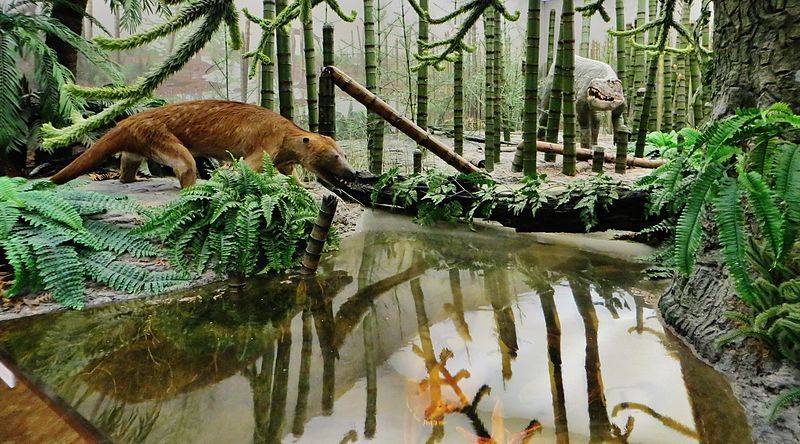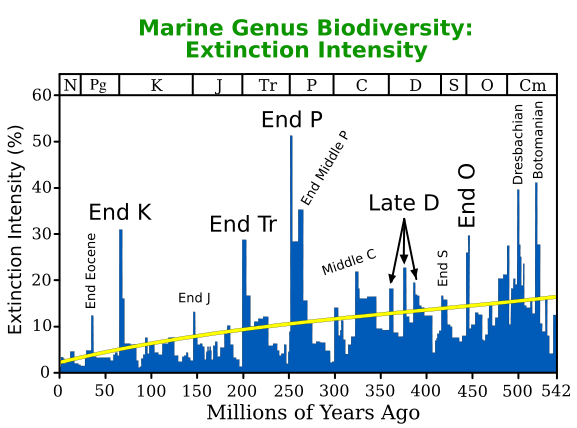By 2250, people may be in a Triassic period.
Welcome to the Triassic Park, where carbon pollution will kill you before the wild beasts

The Triassic period was a tough time for life on Earth, and not only because it was the first act of the dinosaur era. This epoch stretched from 251 to 199 million years ago, and was cut into pieces by mass extinctions that occurred, in part, due to the abnormally high carbon content in the atmosphere.
As a result, the Triassic Land was warmer than modern, it did not have ice caps at the poles, and extensive desertification took place on the supercontinent of Pangea and in wetlands along the coast. A person, most likely, would not have survived in such conditions, even without taking into account the threats of a sudden attack of Dilophosaurs [a type of dinosaur popularized by the book and the film “Jurassic Park” - approx. trans.].
')
Unfortunately, we can move in this direction and be there in the near future, according to a study published in Nature Communications.
A team led by Gavin Foster, a professor of isotope chemistry from the University of Southampton, predicts that atmospheric pollution with carbon dioxide CO 2 will reach the Late Triassic levels - 2000 * 10 -6 by 2250, if people continue to consume fossil fuel at the current rate.
If civilization seriously intends to spend all the reserves of traditional and unconventional fuel, then the level of CO 2 by the 24th century will increase to a catastrophic 5000 * 10 -6 . This “pressure on climate,” as the factors influencing the Earth’s climate are called, will be exacerbated due to the slow increase in the brightness of the Sun, occurring within the normal life cycle of a star.
“Since the Sun was dimmer in the Triassic, the impact on the climate 200 million years ago was not as great as could be expected in the future with such a high content of CO 2 ,” writes Foster. “So, the resulting climate change will not only be the fastest in millions of years of the planet’s life, the existing climate, as far as we can judge, will not have natural analogues, at least in the last 420 million years.”

Extinction intensity graph
In other words, if people continue to pollute the atmosphere with greenhouse gases, we can create an enhanced version of the extinction that occurred at the end of the Triassic period, known as the Triassic-Jurassic extinction . It was accelerated by the release of poisonous gases by volcanoes into the atmosphere.
It is believed that the same process of gas emissions by volcanoes led to extinction in the Permian period immediately preceding the Triassic. It ended with the " Great Extinction ", the largest extinction in history from the famous scientists who killed 95% of the species on Earth .
“Carbon dioxide emitted by volcanoes [during the Permian and Triassic extinctions] is similar to carbon dioxide emitted by us when burning fossil fuels,” wrote Steve Brusat, a paleontologist from the University of Edinburgh, who did not participate in the study.
The rate of human production of greenhouse gases, which unscrew the Earth's thermostat, is ahead of volcanic eruptions leading to the Great Extinction.
“These things keep me awake,” said Brusat. - Our actions can be even worse. The key here is speed. Without a doubt, the Earth will survive all the terrible things that we do with the environment. She always survives. It recovered from the end of the Permian period and the end of the Triassic volcanoes, and from the asteroid that killed the dinosaurs. ”
Brusat is concerned that the Earth is now changing so quickly that people do not have time to adapt to the changes. "People evolved under strictly defined conditions on Earth," he says. We are accustomed to a specific temperature range, and our urban, agricultural systems, transportation, and many other things have been developed taking into account this particular range.
“Therefore, I think that it would be difficult for people to flourish if we were magically transported to the end of the Triassic period,” he says.

The Triassic period was a tough time for life on Earth, and not only because it was the first act of the dinosaur era. This epoch stretched from 251 to 199 million years ago, and was cut into pieces by mass extinctions that occurred, in part, due to the abnormally high carbon content in the atmosphere.
As a result, the Triassic Land was warmer than modern, it did not have ice caps at the poles, and extensive desertification took place on the supercontinent of Pangea and in wetlands along the coast. A person, most likely, would not have survived in such conditions, even without taking into account the threats of a sudden attack of Dilophosaurs [a type of dinosaur popularized by the book and the film “Jurassic Park” - approx. trans.].
')
Unfortunately, we can move in this direction and be there in the near future, according to a study published in Nature Communications.
A team led by Gavin Foster, a professor of isotope chemistry from the University of Southampton, predicts that atmospheric pollution with carbon dioxide CO 2 will reach the Late Triassic levels - 2000 * 10 -6 by 2250, if people continue to consume fossil fuel at the current rate.
If civilization seriously intends to spend all the reserves of traditional and unconventional fuel, then the level of CO 2 by the 24th century will increase to a catastrophic 5000 * 10 -6 . This “pressure on climate,” as the factors influencing the Earth’s climate are called, will be exacerbated due to the slow increase in the brightness of the Sun, occurring within the normal life cycle of a star.
“Since the Sun was dimmer in the Triassic, the impact on the climate 200 million years ago was not as great as could be expected in the future with such a high content of CO 2 ,” writes Foster. “So, the resulting climate change will not only be the fastest in millions of years of the planet’s life, the existing climate, as far as we can judge, will not have natural analogues, at least in the last 420 million years.”

Extinction intensity graph
In other words, if people continue to pollute the atmosphere with greenhouse gases, we can create an enhanced version of the extinction that occurred at the end of the Triassic period, known as the Triassic-Jurassic extinction . It was accelerated by the release of poisonous gases by volcanoes into the atmosphere.
It is believed that the same process of gas emissions by volcanoes led to extinction in the Permian period immediately preceding the Triassic. It ended with the " Great Extinction ", the largest extinction in history from the famous scientists who killed 95% of the species on Earth .
“Carbon dioxide emitted by volcanoes [during the Permian and Triassic extinctions] is similar to carbon dioxide emitted by us when burning fossil fuels,” wrote Steve Brusat, a paleontologist from the University of Edinburgh, who did not participate in the study.
The rate of human production of greenhouse gases, which unscrew the Earth's thermostat, is ahead of volcanic eruptions leading to the Great Extinction.
“These things keep me awake,” said Brusat. - Our actions can be even worse. The key here is speed. Without a doubt, the Earth will survive all the terrible things that we do with the environment. She always survives. It recovered from the end of the Permian period and the end of the Triassic volcanoes, and from the asteroid that killed the dinosaurs. ”
Brusat is concerned that the Earth is now changing so quickly that people do not have time to adapt to the changes. "People evolved under strictly defined conditions on Earth," he says. We are accustomed to a specific temperature range, and our urban, agricultural systems, transportation, and many other things have been developed taking into account this particular range.
“Therefore, I think that it would be difficult for people to flourish if we were magically transported to the end of the Triassic period,” he says.
Source: https://habr.com/ru/post/403939/
All Articles